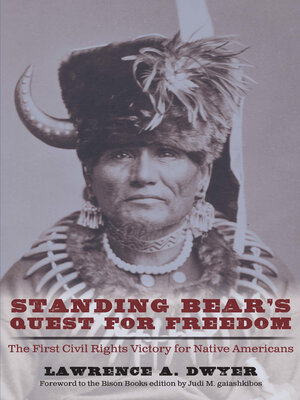Standing Bear's Quest for Freedom
ebook ∣ the First Civil Rights Victory for Native Americans
By Lawrence A. Dwyer

Sign up to save your library
With an OverDrive account, you can save your favorite libraries for at-a-glance information about availability. Find out more about OverDrive accounts.
Find this title in Libby, the library reading app by OverDrive.



Search for a digital library with this title
Title found at these libraries:
| Library Name | Distance |
|---|---|
| Loading... |
Winner of the 2023 Nebraska Book Award
Chief Standing Bear of the Ponca Nation faced arrest for leaving the U.S. government's reservation, without its permission, for the love of his son and his people. Standing Bear fought for his freedom not through armed resistance but with bold action, strong testimony, and heartfelt eloquence. He knew he and his people had suffered a great injustice.
Standing Bear wanted the right to live and die with his family on the beloved land of his Ponca ancestors, located within the Great Plains of Nebraska. In telling his story, Standing Bear's Quest for Freedom relates an unprecedented civil rights victory for Native Americans: for the first time, in 1879, a federal court declared a Native American to be a "person"—a human being with the right to file an action for a redress of grievances in a federal court, like every other person in the United States.
Standing Bear's victory in Standing Bear v. Crook began a national movement of reforming Native American rights—albeit a slow one. Because of the courage and leadership of Chief Standing Bear, the pervasive spirit of indifference of most Americans toward Native Americans was disrupted by this historic decision. America would never be the same.
Chief Standing Bear of the Ponca Nation faced arrest for leaving the U.S. government's reservation, without its permission, for the love of his son and his people. Standing Bear fought for his freedom not through armed resistance but with bold action, strong testimony, and heartfelt eloquence. He knew he and his people had suffered a great injustice.
Standing Bear wanted the right to live and die with his family on the beloved land of his Ponca ancestors, located within the Great Plains of Nebraska. In telling his story, Standing Bear's Quest for Freedom relates an unprecedented civil rights victory for Native Americans: for the first time, in 1879, a federal court declared a Native American to be a "person"—a human being with the right to file an action for a redress of grievances in a federal court, like every other person in the United States.
Standing Bear's victory in Standing Bear v. Crook began a national movement of reforming Native American rights—albeit a slow one. Because of the courage and leadership of Chief Standing Bear, the pervasive spirit of indifference of most Americans toward Native Americans was disrupted by this historic decision. America would never be the same.







